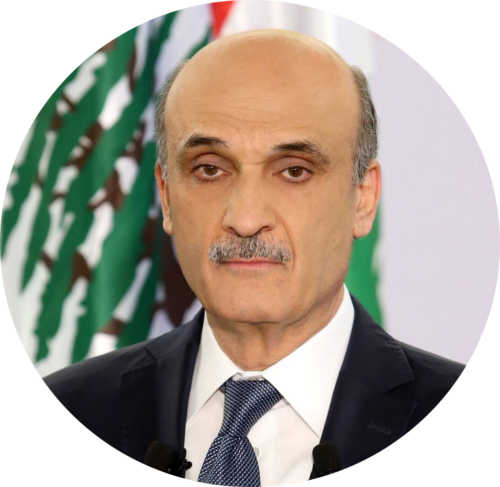 The Man of Cedar: The three lives of Samir Geagea
The Man of Cedar: The three lives of Samir Geagea
Foreword
When the belligerents have laid down their weapons, in 1989, after the signing of the Taif national reconciliation document that officially ended the Lebanon war, we believed that it was indeed finished. Whatever the iniquity of its application and the price to be paid, the Taif Agreement allowed us to get out of the spiral of violence to get on with the reconstruction of our lives. Most of us – those who stayed, those who had left, those who were gone and returned, those who belong to parties and those who had never accepted the parties – stored in the depths of our consciousness our resentment and fears hiding a lot of things. We did not ask questions to our parents, and especially, we haven’t told a word to our children. In short, we have all made as if all of this had not taken place, thinking thus definitively to turn the page. Almost all, because during this time, a man was detained and his supporters were in resistance. We have not given the attention it deserved to the story, since he is alone, this “Lord of war” – that is how the press referred to him – personified the dark years that we wanted at all costs to erase of our memories. Happy to be able to travel from North to South a country that we were learning to discover, we, who had grown up with lines of demarcation in our minds, continued to live like if the wall of silence of Syrian guardianship was almost a normal consequence of this peace torn at the price of so many renunciations.
Eleven years later, in 2005, following the assassination of Prime Minister Hariri, we found ourselves on Martyrs square: three generations of Lebanese, all faiths together, gray or black hair, surprised teenagers and grandparents a little weak but determined, waving flags and banners, chanting slogans that would have been unthinkable to barely pronounce a few days earlier. Now that our country’s sovereignty was restored, politics invented again our lives. Our leaders, even the most zealous of the pm-Syrians, seemed to be in their right mind and called the population to unite beyond sectarian and ideological divisions in “living together” which augured full of optimism for the future. In the wake of this “revolution”, Samir Geagea, the man who missed the call the first days of the spring of Beirut, is finally out of darkness. He has changed a lot, it was said. This event, far from destroying him, would have made him not only stronger, but also more conciliatory and more human. Surrounded by a halo of mystery, he returned to the political scene along with former warlords, sons of political families and other vital players in the history of our country.
And then years have passed, the euphoria of the early days gave way to compromises, defections and changes of opinion. The disappointments were often bitter, but his commitment has not diminished. While some, who have neither managed to overcome their resentments nor to hunt the ghosts of the past, continue to denigrate his speech and his career, many others are attracted by the strength of his convictions as his capacity to resist, and openly adhere to his political line. Others again, without so far rejecting the latter, temper their approval by a constant reminder of his past.
Today, while the history seems to be repeating itself and the issues left open yesterday come back to haunt us, I felt it necessary to understand what really happened during these dark years experienced by the Lebanon. Only Samir Geagea could embody this troubled era marked by violence, blood and humiliation, certainly, but also by acts of heroism and small victories driven from destiny.
When I started writing this book, we said little about the chief of the Lebanese Forces. It was several months before the story propels him to the front of the stage. He loaned to interviews with the application that characterizes, engaged at the beginning with some reluctance. He did not want to be, once more, the only one among the protagonists having to justify a military and political course in the urgency of the war. Only history, according to him, would be able to put things in their right place because of his action and the one of the Lebanese Forces. Then, as the reserves have dissipated, he spoke with increasing frankness without however this biography being “authorized” in the usual sense of the term, as Samir Geagea made no prerequisite and not read – much less approved or amended – the text before publication. It is sincere appreciation here for this vote of confidence that he honors.
Prologue
1993
Once swarming with life, sounds and scents, Beirut streets are delivered to rats, covered by straw and boxes and stinking garbage and death. Downtown, that once was the scene of the best and the worst, is not more than a pile of stones invaded by scrub and wild grasses. All neighborhoods have been spared by destruction; all villages have known fear, exodus or violence. Buildings are hit by bomb shells; balconies hanging blacked out facades; potholes waiting like gaping wounds. The country bloodless which has emerged from its long nightmare is a vast construction site. Everything is to be redone.
Over the years of war and regarding the pace of many battles, murderers turned into guards, allies into detractors, firefighters into arsonists, referees into fighters. While the spectrum of violence, blockades, headquarters, bombing and privation move off, no euphoria occurs within the Christian resistance. Peace established, this apparent calm, which released the population of shelters and gave a semblance of normality, is not reassuring.
For belligerents, the conclusion has a bitter taste. General Michel Aoun is in exile. And Samir Geagea, the leader of the Lebanese Forces (FL), entrenched in its headquarters transferred to Ghodreiss in the Kesrouan mountains. In the East camp, the offensive launched by the commanding General of the Army against the Syrian occupant who had led to the Taif Agreement, then the war of elimination that made him to be opposed to FL militia had caused a catastrophic break in the Christian ranks. The Muslim community had not been spared by the divisions. The regular clashes between Amal and Hezbollah, in the South of the Lebanon and the Shiite suburb, and the devastating war waged by the Amal militia against the Palestinian camps, where Yasser Arafat was trying to initiate a return, resulted in a human and military disaster. These fratricidal fighting had served to consolidate the purpose of the Syrian occupier which located once again as referee.
After the questioning of the existence of the country, the collapse of its institutions, its 150 000 dead, 200 000 injured, 50 000 disabled and 900 000 exiles, while the tears of widows and orphans continued to flow, it was claimed that the war was over. The dead had been buried and the missing should be forgotten. A national consensus has been established so the various political factions and the eighteen communities, commended to live in a country being tightly bunched, cannot position themselves in the camp of winners or in the camp of the defeated.
The mechanism of standardization began without initiating any cohesion process, without any public apology being presented. The same feelings of bitterness, injustice and apprehension remained in people’s minds, because the link of national reconciliation was not on the agenda of the Syrians. Damascus had no desire to encourage a pardon that would be unfavorable to the control of the country.
Another, more insidious kind of conflict began, delivering every day its batch of humiliation and subjugation. The enemy was everywhere, sometimes crouched in the shadows, sometimes manifested in broad daylight. But still determined to show its supremacy through a system of information and trying in vain to draw the attention of indifferent international bodies: he had the unconditional support of the majority of the Lebanese leaders and especially a blank check of all those officials, military, contractors, politicians, businessmen, who dreamed of benefit from reconstruction. And if the price to
Since always in the country of the Cedar Tree, a little more than elsewhere, we resists badly to the sirens of profit and power.
Buy the book from Amazon.com.
